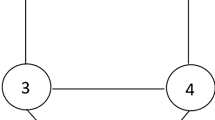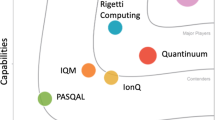Abstract
This paper proposes an approach to evolve quantum circuits at the gate level, based on a hybrid quantum-inspired evolutionary algorithm. This approach encodes quantum gates as integers and combines the cost and correctness of quantum circuits into the fitness function. A fast algorithm of matrix multiplication with Kronecker product has been proposed to speed up the calculation of matrix multiplication in individuals evaluation. This algorithm is shown to be better than the known best algorithm for matrix multiplication when a certain condition holds. The approach of evolving quantum circuits is validated by some experiments and the effects of some parameters are investigated. And finally, some features of the approach are also discussed.
Similar content being viewed by others
References
Barenco A, Bennett C, Cleve R, DiVincenzo DP, Margolus N, Shor P, Sleator T, Smolin JA and Weifurter H (1995). Elementary gates for quantum computation. Phys Rev A 52: 3457–3467
Cirac JI and Zoller P (1995). Quantum computations with cold trapped ions. Phys Rev Lett 74: 4091–4094
Coello CAC (2005) An introduction to evolutionary algorithms and their applications. In: Corchado FFR, Larios-Rosillo V, Unger H (eds) ISSADS, vol 3563 of Lecture Notes in Computer Science. Springer, Berlin, pp 425–442
Deutsch D (1989). Quantum computational networks. Proc R Soc Lond A 425: 73–90
Giraldi GA, Portugal R, Thess RN (2004) Genetic algorithms and quantum computation. arXiv: cs.NE/0403003v1, 4
Holland JH (1992) Adaptation in natural and artificial systems. MIT Press, Cambridge
Horn R and Johnson C (1994). Topics in matrix analysis. Cambridge University Press, Cambridge
Iwama K, Kambayashi Y, Yamashita S (2002) Transformation rules for designing cnot-based quantum circuits. In: Proceedings 39th Design Automation Conference (DAC’02), pp 419–424
Jones JA, Hansen RH and Mosca M (1998). Quantum logic gates and nuclear magnetic resonance pulse sequences. J Magn Reson 135: 353–360
Koza JR (1992) Genetic programming: on the programming of computers by means of natural selection. MIT Press, Cambridge
Leier A, Banzhaf W (2003) Evolving Hogg’s quantum algorithm using linear-tree GP. In: Genetic and evolutionary computation, GECCO-2003 (Chicago, 2003), vol 2723 of LNCS. Springer, Berlin, pp 390–400
Lukac M, Perkowski M (2002) Evolving quantum circuits using genetic algorithm. In: Proceedings the 2002 NASA/DoD conference on evolvable hardware, pp 177–185
Lukac M, Perkowski M, Goi H, Pivtoraiko M, Yu CH, Chung K, Jeech H, Kim B-G and Kim Y-D (2003). Evolutionary approach to quantum and reversible circuits synthesis. Artif Intell Rev 20(3–4): 361–417
Maslov D, Dueck GW and Miller DM (2005). Toffoli network synthesis with templates. IEEE Trans Comput Aided Des Integr Circuits Syst 24(6): 807–817
Maslov D, Young C, Miller DM, Dueck GW (2005) Quantum circuit simplification using templates. In: Proceedings the 2005 design, automation and test in Europe conference and exhibition, vol 2, pp 1208–1213
Massey P, Clark JA, Stepney S(2004) Evolving quantum circuits and programs through genetic programming. In: Genetic and evolutionary computation conference: GECCO 2004, Seattle, USA, June 2004, vol 3103 of LNCS. Springer, Berlin, pp 569–580
Massey P, Clark JA, Stepney S (2005) Evolution of a human-competitive quantum fourier transform algorithm using genetic programming. In: Proceedings of the 2005 conference on genetic and evolutionary computation (GECCO’05) (New York, NY, USA, 2005), ACM Press, New York, pp 1657–1663
Meter RV and Itoh KM (2005). Fast quantum modular exponentiation. Phys Rev A 71: 052320
Miller DM, Maslov D and Dueck G (2006). Synthesis of quantum multiple-valued circuits. J Multiple-Valued Logic Soft Comput 12(5–6): 431–450
Nielsen MA and Chuang IL (2000). Quantum computation and quantum information. Cambridge University Press, New York
Perkowski M et al (2003) A hierarchical approach to computer aided design of quantum circuits. In: Proceedings 6th international symposium on representations and methodology of future computing technology, pp 201–209
Reid T (2005) On the evolutionary design of quantum circuits. Master’s thesis, Waterloo, Ontario, Canada
Rothlauf F (2006). Representations for genetic and evolutionary algorithms, 2nd edn. Springer, Berlin
Rubinstein RIP (2001) Evolving quantum circuits using genetic programming. In: CEC2001, vol 1, pp 144–151
Schack R and Caves CM (1999). Classical model for bulk-ensemble nmr quantum computation. Phys Rev A 60(6): 4354–4362
Shende VV, Markov IL and Bullock SS (2004). Minimal universal two-qubit controlled-not-based circuits. Phys Rev A 69: 062321
Spector L, Barnum H, Bernstein H, Swamy N (1999) Quantum computing applications of genetic programming. In: Spector L, O’Reilly U-M, Langdon W, Angeline P (eds) Advances in genetic programming, vol 3. MIT Press, Cambridge, chap. 7, pp 135–160
Spector L, Barnum H, Bernstein HJ, Swamy N (1999) Finding a better-than-classical quantum and/or algorithm using genetic programming. In: CEC1999, vol 3, pp 2239–2246
Williams CP, Gray AG (1999) Automated design of quantum circuits. In: Quantum computing and communications: first NASA conference (QCQC’98), vol 1509 of LNCS. Springer, Berlin, pp 113–125
Yabuki T, Iba H (2000) Genetic algorithms and quantum circuit design, evolving a simpler teleportation circuit. In: 2000 Genetic and evolutionary computation conference, pp 421–425
Yang Q (2006) The research of a hybrid quantum-inspired evolutionary algorithm. Master’s thesis, Wuhan University, China
Yang Q, Zhong S and Ding S (2006). A simple quantum inspired evolutionary algorithm and its application to numerical optimization problems. J Wuhan Univ (Nat Sci Ed) 52(1): 21–24
Author information
Authors and Affiliations
Corresponding author
Rights and permissions
About this article
Cite this article
Ding, S., Jin, Z. & Yang, Q. Evolving quantum circuits at the gate level with a hybrid quantum-inspired evolutionary algorithm. Soft Comput 12, 1059–1072 (2008). https://doi.org/10.1007/s00500-007-0273-9
Published:
Issue Date:
DOI: https://doi.org/10.1007/s00500-007-0273-9




